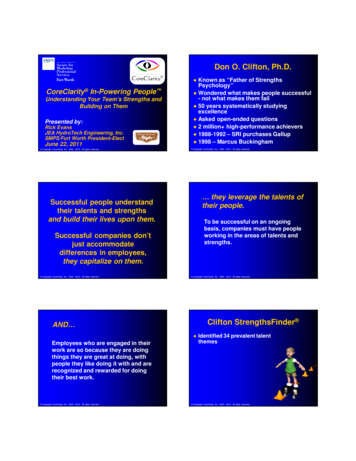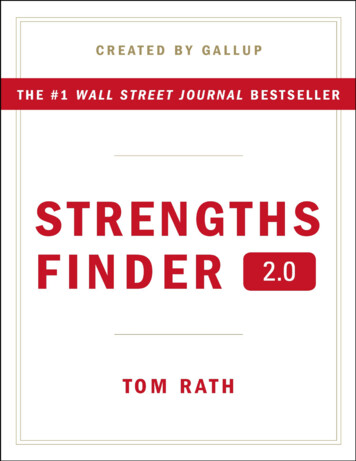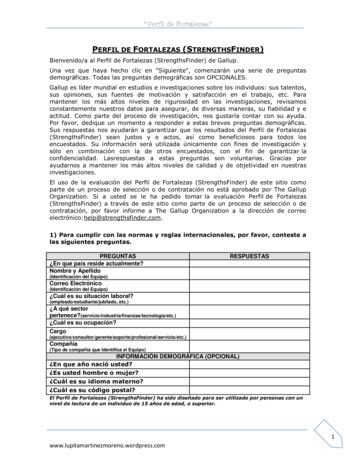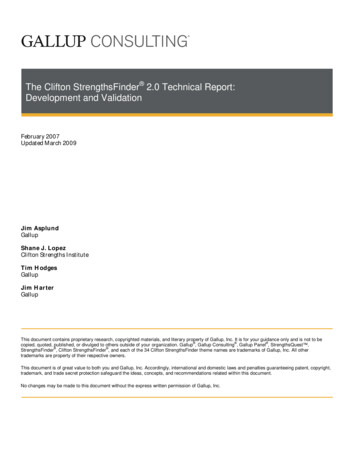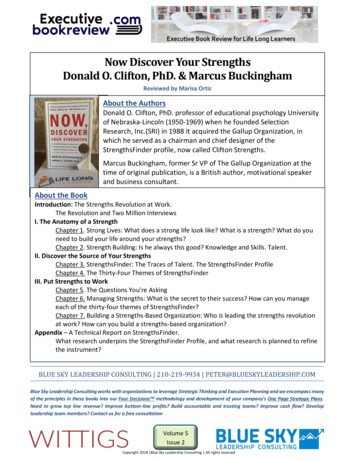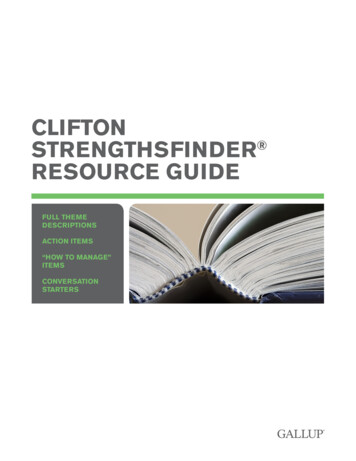
Transcription
CLIFTONSTRENGTHSFINDER RESOURCE GUIDEFULL THEMEDESCRIPTIONSACTION ITEMS“HOW TO MANAGE”ITEMSCONVERSATIONSTARTERS
Intellectual Property StatementThis document contains proprietary research, copyrighted materials, and literary property of Gallup, Inc.It is for the guidance of your organization only and is not to be copied, quoted, published, or divulged toothers outside your organization. All of Gallup, Inc.’s content is protected by copyright. Neither the clientnor the participants shall copy, modify, resell, reuse, or distribute the program materials beyond the scope ofwhat is agreed upon in writing by Gallup, Inc. Any violation of this Agreement shall be considered a breachof contract and misuse of Gallup, Inc.’s intellectual property.This document is of great value to Gallup, Inc. Accordingly, international and domestic laws and penaltiesguaranteeing patent, copyright, trademark, and trade secret protection safeguard the ideas, concepts, andrecommendations related within this document.No changes may be made to this document without the express written permission of Gallup, Inc.Gallup , The Gallup Path , Business Impact Analysis , Q12 , StrengthsFinder , Clifton StrengthsFinder ,and each of the 34 Clifton StrengthsFinder theme names are trademarks of Gallup, Inc. All othertrademarks and copyrights are property of their respective owners.MS Col SFResGd-SPC en-US 0914v5 bk
CLIFTON STRENGTHSFINDER RESOURCE GUIDETABLE OF CONTENTSGeneral Information on the Clifton StrengthsFinder. 1The Clifton StrengthsFinder Themes (in alphabetical order). 2Full Theme DescriptionAction Items“How to Manage” ItemsConversation StartersCopyright 2000, 2001 Gallup, Inc. All rights reserved.MS Col SFResGd-SPC en-US 0914v5 bk
CLIFTON STRENGTHSFINDER RESOURCE GUIDEGENERAL INFORMATION ON THECLIFTON STRENGTHSFINDER Research and Concept The conceptual basis of the Clifton StrengthsFinder is grounded in more than three decades of the studyof success across a wide variety of functions (from business to education) and many different cultures(nearly 50 countries).The Clifton StrengthsFinder measures not strengths, but the presence of talents in 34 general areas,or “themes.” While talents (recurring patterns of thought, feeling, or behavior that can be productivelyapplied) naturally exist within individuals, strengths (the ability to provide consistent, near-perfectperformance in a specific task) must be developed and are the product that results when one’s talents arerefined with acquired skills and knowledge.For that reason, the Clifton StrengthsFinder serves as a starting point for self-discovery in all of ourstrengths-based development programs. After an individual has completed the assessment, a group ofdevelopmental suggestions is customized to the individual’s top five themes — called his or her SignatureThemes — and his or her role.An individual’s Signature Themes are very unique to that person. When ranking within the set of fivethemes is taken into consideration, 33,390,720 different sets of Signature Themes are possible.We do not advocate the use of the Clifton StrengthsFinder in either employee selection or hiring. Wetake this approach to keep individuals focused on their own intrapersonal development rather thaninterpersonal comparison. We do create and administer customized selection tools for our clients, usingother assessments that are tailored to specific roles.Application Our primary use of the Clifton StrengthsFinder is in a purely developmental context. This means that wedo not teach that any specific theme of talent is more appropriate for one role than for another (i.e., we donot say that “Achievers” should be managers). Instead, we first look at each person as an individual on thebasis of talent, then help that individual discover how to build upon his or her talents to develop strengthswithin his or her role.Since 1998, we have used the Clifton StrengthsFinder as our initial diagnostic tool in all of ourdevelopment programs with various academic institutions, faith-based organizations, major businesses,and other organizations.During that time, Clifton StrengthsFinder assessments have initiated the development of individualsacross hundreds of roles, including: nurse, lawyer, teacher, manager, leader, student, school administrator,customer service representative, salesperson, pastor, and many others.As of April 2014, more than 10 million people in more than 50 countries had received a CliftonStrengthsFinder talent assessment. The instrument is available in more than 20 languages.1Copyright 2000, 2001 Gallup, Inc. All rights reserved.MS Col SFResGd-SPC en-US 0914v5 bk
CLIFTON STRENGTHSFINDER RESOURCE GUIDEACHIEVER Theme DescriptionYour Achiever theme helps explain your drive. Achiever describes a constant need for achievement. You feelas if every day starts at zero. By the end of the day you must achieve something tangible in order to feel goodabout yourself. And by “every day” you mean every single day — workdays, weekends, vacations. No matter howmuch you may feel you deserve a day of rest, if the day passes without some form of achievement, no matter howsmall, you will feel dissatisfied. You have an internal fire burning inside you. It pushes you to do more, to achievemore. After each accomplishment is reached, the fire dwindles for a moment, but very soon it rekindles itself,forcing you toward the next accomplishment. Your relentless need for achievement might not be logical. It mightnot even be focused. But it will always be with you. As an Achiever you must learn to live with this whisper ofdiscontent. It does have its benefits. It brings you the energy you need to work long hours without burning out.It is the jolt you can always count on to get you started on new tasks, new challenges. It is the power supply thatcauses you to set the pace and define the levels of productivity for your workgroup. It is the theme that keeps youmoving.Action Items Select jobs in which you have the leeway to work as hard as you want, and in which you are encouragedto measure your own productivity. You will feel stretched and alive in these environments. You do not require much motivation from your supervisor. Take advantage of your self-motivation bysetting challenging goals. Set a more stretching goal every time you finish a project. Own the fact that you might work longer hours than most people, and that you might not need as muchsleep as many other people do. Choose to work with other hard workers. Share your goals with them so they can help you. Count personal achievements in your scoring “system.” This will help you direct your Achiever themetoward family as well as work.Accept that you might be discontented even when you achieve.Take a moment to appreciate your successes. You can look ahead tomorrow. Today, celebrate.Partner with someone with a strong Discipline or Focus theme. This person can help you use your energyas efficiently as possible.2Copyright 2000, 2001 Gallup, Inc. All rights reserved.MS Col SFResGd-SPC en-US 0914v5 bk
CLIFTON STRENGTHSFINDER RESOURCE GUIDEHow to Manage a Person Especially Talented in the Achiever ThemeWhen there are times that require extra work, call on this person. Remember that the saying “If you want to geta job done, ask a busy person” is generally true.Recognize that he likes to be busy. Sitting in meetings is likely to be very boring for him. So either let him gethis work done or arrange to have him attend only those meetings where you really need him and he can be fullyengaged.Help him measure what he gets done. He may well enjoy keeping track of hours, but, more importantly, heshould have a way to measure cumulative production. Simple measures such as number of customers served,customers known by name, files reviewed, prospects contacted, or patients seen will help give him definition.Establish a relationship with this person by working alongside him. Working hard together is often a bondingexperience for him. And keep low producers away from him. “Slackers” annoy him.When this person finishes a job, a rest or an easy assignment is rarely the reward he wants. He will be much moremotivated if you give recognition for past achievement and then a new goal that stretches him.This person may well need less sleep and get up earlier than most. Look to him when these conditions arerequired on the job. Also, ask him questions such as “How late did you have to work to get this done?” or “Whendid you come in this morning?” He will appreciate this kind of attention.You may be tempted to promote him to higher-level roles simply because he is a self-starter. This may be amistake if it leads him away from what he does best. A better course would be to pinpoint his other themes andstrengths, and look for opportunities for him to do more of what he does well.Conversation Starters Tell me about a typical day for you. What do you enjoy about your day?Tell me about a current challenge. Is there another one on the horizon? If so, tell me about it.What goals are you working toward? Who knows about them? Who gives you feedback?What do you feel a sense of urgency about today?3Copyright 2000, 2001 Gallup, Inc. All rights reserved.MS Col SFResGd-SPC en-US 0914v5 bk
CLIFTON STRENGTHSFINDER RESOURCE GUIDEACTIVATOR Theme Description“When can we start?” This is a recurring question in your life. You are impatient for action. You may concede thatanalysis has its uses or that debate and discussion can occasionally yield some valuable insights, but deep downyou know that only action is real. Only action can make things happen. Only action leads to performance. Oncea decision is made, you cannot not act. Others may worry that “there are still some things we don’t know,” butthis doesn’t seem to slow you. If the decision has been made to go across town, you know that the fastest way toget there is to go stoplight to stoplight. You are not going to sit around waiting until all the lights have turnedgreen. Besides, in your view, action and thinking are not opposites. In fact, guided by your Activator theme, youbelieve that action is the best device for learning. You make a decision, you take action, you look at the result, andyou learn. This learning informs your next action and your next. How can you grow if you have nothing to reactto? Well, you believe you can’t. You must put yourself out there. You must take the next step. It is the only wayto keep your thinking fresh and informed. The bottom line is this: You know you will be judged not by what yousay, not by what you think, but by what you get done. This does not frighten you. It pleases you.Action Items Seek work in which you can make your own decisions and act upon them. In particular, look for start-upor turn-around situations. Take responsibility for your intensity by always asking for action when you are a part of a group. Prepare a simple explanation as to why any decision, even the wrong one, will help you learn, andtherefore will make the next decision more informed. Use it when people challenge you and tell you toslow down. Try to work only on committees that are action-oriented. Much committee work might prove very boringfor you. Give the reasons why your requests for action must be granted; otherwise, others might dismiss you asimpatient and label you a “ready, fire, aim” person. Recognize that your “pushiness” might sometimes intimidate others. Avoid activity for activity’s sake. If you want people to join in your activity, you will need to provide themwith a purpose for their actions.To avoid conflict later, ensure that your manager judges you on measurable outcomes rather than yourprocess. Your process is not always pretty.Partner with someone with a strong Strategic or Analytical theme. This person can help you see howhigh the cliff is before you fall off it.4Copyright 2000, 2001 Gallup, Inc. All rights reserved.MS Col SFResGd-SPC en-US 0914v5 bk
CLIFTON STRENGTHSFINDER RESOURCE GUIDEHow to Manage a Person Especially Talented in the Activator ThemeAsk this person what new goals or improvements should be achieved by your division. Select an area that fits andgive her the responsibility for initiating and organizing the project.Let her know that you know she is a person who can make things happen and that you will be asking her for helpat key times. Your expectations will energize her.Assign her to a team that is bogged down and talks more than it performs. She will stir them into action.When this person complains, listen carefully — you may learn something. But then get her on your side bytalking about new initiatives that she can lead or new improvements she can make tomorrow. Do this quicklybecause, unchecked, she can quickly stir up negativity when she gets off track.Examine her other dominant themes. If she is strong in Command, she may have the potential to sell andpersuade very effectively. If she is also strong in Relator or Woo, she may become an excellent recruiter for you,drawing in the recruit and then pressing him to commit.To prevent her from running into too many obstacles, partner her with people strong in Strategic or Analytical.They can help her look around the corner. However, you may have to intercede for her in these partnerships sothat her instinct to act is not stymied by their desire to project and analyze.Conversation Starters Tell me about something you have made happen. How did you feel about it? What reaction(s) did younotice from those around you? What spurs you to take action quickly?When you are in a group, are you the person who asks for action? Do you usually get it?How do you typically start taking action? What is your “system” for getting things going?5Copyright 2000, 2001 Gallup, Inc. All rights reserved.MS Col SFResGd-SPC en-US 0914v5 bk
CLIFTON STRENGTHSFINDER RESOURCE GUIDEADAPTABILITY Theme DescriptionYou live in the moment. You don’t see the future as a fixed destination. Instead, you see it as a place that youcreate out of the choices that you make right now. And so you discover your future one choice at a time. Thisdoesn’t mean that you don’t have plans. You probably do. But this theme of Adaptability does enable you torespond willingly to the demands of the moment even if they pull you away from your plans. Unlike some, youdon’t resent sudden requests or unforeseen detours. You expect them. They are inevitable. Indeed, on some levelyou actually look forward to them. You are, at heart, a very flexible person who can stay productive when thedemands of work are pulling you in many different directions at once.Action Items Seek roles in which success depends upon responding to constantly changing circumstances. Considercareer areas such as journalism, live television production, emergency healthcare, and customer service. Inroles of this type, the best react the fastest and stay level headed. Fine-tune your responsiveness. For example, if your job demands unanticipated travel, learn how to packand leave in 30 minutes. If your work pressure comes in unpredictable spurts, practice the first threemoves you will always make when the pressure hits. During times when the pressure is on, help your colleagues find productive ways to relieve the pressureand therefore make progress. You can be the spark that “unfreezes” them. Cultivate your reputation as a calm and reassuring person when others become upset by daily events. Avoid roles that demand structure and predictability. These roles will quickly frustrate you, make you feelinadequate, and stifle your independence. Look to others for planning. People who are strong in themes such as Focus, Strategic, or Belief can helpyou shape your longer-term goals, leaving you to excel at dealing with the day-to-day variations.Never apologize for your spontaneity. On the contrary, help others realize how many experiences mightbe missed if you don’t seize the moment now.6Copyright 2000, 2001 Gallup, Inc. All rights reserved.MS Col SFResGd-SPC en-US 0914v5 bk
CLIFTON STRENGTHSFINDER RESOURCE GUIDEHow to Manage a Person Especially Talented in the Adaptability ThemeThis person lives to react and respond. Position him so that his success depends on his ability to accommodate theunforeseen and then run with it.Let him know about the planning you are doing, but unless he is also strong in Focus, don’t expect him to do theplanning with you. He is likely to find much planning work endlessly boring.With his instinctively flexible nature he is a valuable addition to almost every team. When balls are dropped orplans go awry, he will adjust to the new circumstances and try to make progress. He will not sit on the sidelinesand sulk.He will be most productive on short-term assignments that require immediate action. He prefers a life filled withmany quick skirmishes rather than long, drawn-out campaigns.Examine his other dominant themes. If he also has a talent for Empathy, you might try positioning him where hehas to be sensitive to and accommodate the varied needs of customers or guests. If one of his other strong themesis Developer, you should cast him in a mentor role. With his willingness to “go with the flow” he can provide awonderful environment in which others can experiment and learn.Be ready to excuse this person from meetings about the future, such as goal-setting meetings or career-counselingsessions. He is a “here-and-now” person and he will find these meetings rather irrelevant.Conversation Starters What needs to be done today? What are you responding to?Did you use your flexibility today? What happened? How have things worked out?What do you like about today? What have you enjoyed today?7Copyright 2000, 2001 Gallup, Inc. All rights reserved.MS Col SFResGd-SPC en-US 0914v5 bk
CLIFTON STRENGTHSFINDER RESOURCE GUIDEANALYTICAL Theme DescriptionYour Analytical theme challenges other people: “Prove it. Show me why what you are claiming is true.” In theface of this kind of questioning some will find that their brilliant theories wither and die. For you, this is preciselythe point. You do not necessarily want to destroy other people’s ideas, but you do insist that their theories besound. You see yourself as objective and dispassionate. You like data because they are value free. They have noagenda. Armed with these data, you search for patterns and connections. You want to understand how certainpatterns affect one another. How do they combine? What is their outcome? Does this outcome fit with thetheory being offered or the situation being confronted? These are your questions. You peel the layers back until,gradually, the root cause or causes are revealed. Others see you as logical and rigorous. Over time they will cometo you in order to expose someone’s “wishful thinking” or “clumsy thinking” to your refining mind. It is hopedthat your analysis is never delivered too harshly. Otherwise, others may avoid you when that “wishful thinking” istheir own.Action Items Choose work in which you are paid to analyze data, find patterns, or organize ideas. For example, youmight excel at research (e.g., marketing, financial, medical), database management, editing, or riskmanagement. Whatever your role, identify credible sources upon which you can rely. You are at your best when youhave well-researched sources of information and numbers to support your logic. For example, determinethe most helpful books, Web sites, or publications that can serve as references. Develop your Analytical skills by getting to know and share ideas with the outstanding analysts whospecialize in your area. Take an academic course that will expand your Analytical strength. Specifically, study people whose logicyou admire. Volunteer your Analytical talent. You can be particularly helpful to those who are struggling to organizelarge quantities of data or to bring structure to their ideas. Partner with someone with a strong Activator theme. This person’s impatience will move you quicklythrough the analytical phase into the action phase. Listen to people with the Strategic, Belief, or Empathy themes. Their insights and intuitions are difficultto measure, but are often accurate and valuable nonetheless.8Copyright 2000, 2001 Gallup, Inc. All rights reserved.MS Col SFResGd-SPC en-US 0914v5 bk
CLIFTON STRENGTHSFINDER RESOURCE GUIDEHow to Manage a Person Especially Talented in the Analytical ThemeWhenever this person is involved with an important decision, take time to think through the issues with her. Shewill want to know all the factors affecting the decision.If you are explaining a decision that has already been made, always remember to lay out the logic of the decisionvery clearly. To you it may feel as though you are overexplaining things, but for her this level of detail is essentialif she is to commit to the decision.Every time you have the opportunity, recognize and praise her reasoning ability. She is proud of her disciplinedmind.When defending a decision or a principle, show this person the supporting numbers. She instinctively gives morecredibility to information that displays numbers.Remember that she has a need for exact, well-researched numbers. Never try to pass shoddy data to her ascredible evidence.A highlight in her life is to discover patterns in data. Always give her the opportunity to explain the pattern indetail to you. This will be motivational for her and will help to solidify your relationship.You will not always agree with her, but always take her point of view seriously. She has probably thought throughher points very carefully.Because the accuracy of the work is so important to her, getting a task done correctly may be more important toher than meeting a deadline. Therefore, as the deadline draws near, keep checking in with her to ensure that shehas the necessary time to do it right.Conversation Starters What data have you been considering recently?What “feeds” your analytical need?Who is fun to talk to about factors in a situation?Who might benefit from information and facts you know?9Copyright 2000, 2001 Gallup, Inc. All rights reserved.MS Col SFResGd-SPC en-US 0914v5 bk
CLIFTON STRENGTHSFINDER RESOURCE GUIDEARRANGER Theme DescriptionYou are a conductor. When faced with a complex situation involving many factors, you enjoy managing all ofthe variables, aligning and realigning them until you are sure you have arranged them in the most productiveconfiguration possible. In your mind there is nothing special about what you are doing. You are simply trying tofigure out the best way to get things done. But others, lacking this theme, will be in awe of your ability. “Howcan you keep so many things in your head at once?” they will ask. “How can you stay so flexible, so willing toshelve well-laid plans in favor of some brand-new configuration that has just occurred to you?” But you cannotimagine behaving in any other way. You are a shining example of effective flexibility, whether you are changingtravel schedules at the last minute because a better fare has popped up or mulling over just the right combinationof people and resources to accomplish a new project. From the mundane to the complex, you are always lookingfor the perfect configuration. Of course, you are at your best in dynamic situations. Confronted with theunexpected, some complain that plans devised with such care cannot be changed, while others take refuge inthe existing rules or procedures. You don’t do either. Instead, you jump into the confusion, devising new options,hunting for new paths of least resistance, and figuring out new partnerships — because, after all, there might justbe a better way.Action Items Seek complex, dynamic work environments in which there are few routines. Give people time to understand your new way of doing things when you present it to them. Your mentaljuggling is instinctive, but others might find it difficult to break with the existing procedures. Take thetime to clearly explain why your new way is more effective.Make lists of suggestions for how to improve your work environment.Develop successful strategies for getting things done. Push yourself to keep adding new wrinkles.Learn the goals of the people with whom you work. Let them know that you are aware of their goals.Take on the organization of a big event, a convention perhaps, or a company celebration.Explain that your flexibility doesn’t mean that your priorities are constantly changing. Tell others thatyour priorities remain the same, but that you are simply looking for better ways to implement them.10Copyright 2000, 2001 Gallup, Inc. All rights reserved.MS Col SFResGd-SPC en-US 0914v5 bk
CLIFTON STRENGTHSFINDER RESOURCE GUIDEHow to Manage a Person Especially Talented in the Arranger ThemeThis person will thrive on responsibility, so give him as much as you are able, according to his knowledge andskill levels.He may well have the talent to be a manager or supervisor. His Arranger theme enables him to figure out howpeople with very different strengths can work together.When you are launching a project, give him the opportunity to choose and position the members of the projectteam. He is good at figuring out how each person’s strengths might add greatest value to the team.He is excited by complex, multifaceted assignments. He will thrive in situations where he has many things goingon at the same time.He can be resourceful. Feel confident that you can slot him into a role where something is not working, and hewill enjoy figuring out other ways of doing things.Pay attention to his other strong themes. If he also has talent for Discipline, he may be an excellent organizer,establishing routines and systems for getting things done.Understand that his modus operandi for team building is through trust and relationship. He may well rejectsomeone who he believes is dishonest or does shoddy work.Conversation Starters What big event have you planned or are you planning?What do you like best about pulling all the pieces together?List all the “balls” you have in the air at the moment.11Copyright 2000, 2001 Gallup, Inc. All rights reserved.MS Col SFResGd-SPC en-US 0914v5 bk
CLIFTON STRENGTHSFINDER RESOURCE GUIDEBELIEF Theme DescriptionIf you possess a strong Belief theme, you have certain core values that are enduring. These values vary from oneperson to another, but ordinarily your Belief theme causes you to be family-oriented, altruistic, even spiritual, andto value responsibility and high ethics — both in yourself and others. These core values affect your behavior inmany ways. They give your life meaning and satisfaction; in your view, success is more than money and prestige.They provide you with direction, guiding you through the temptations and distractions of life toward a consistentset of priorities. This consistency is the foundation for all your relationships. Your friends call you dependable. “Iknow where you stand,” they say. Your Belief makes you easy to trust. It also demands that you find work thatmeshes with your values. Your work must be meaningful; it must matter to you. And guided by your Belief themeit will matter only if it gives you a chance to live out your values.Action Items Clarify your values by thinking about one of your best days ever. How did your values play into thesatisfaction that you received from your best day? How can you organize your life to repeat that day asoften as possible? Don’t be afraid to give voice to your values. This will help others know who you are and how to relateto you. Actively seek roles that fit your values. In particular, think about joining organizations that define theirpurpose by the contribution they make to society. Express your values outside of the workplace by volunteering for a hospital board or a school board, or byrunning for an elected office. Actively cultivate friends who share your basic values. Consider your best friend. Does this person shareyour value system? Partner with someone with a strong Futuristic theme. This person can energize you by painting a vividpicture of the direction in which your values will lead. Accept that other people might have values different from your own. Having strong Belief does notequate with being judgmental.12Copyright 2000, 2001 Gallup, Inc. All rights reserved.MS Col SFResGd-SPC en-US 0914v5 bk
CLIFTON STRENGTHSFINDER RESOURCE GUIDEHow to Manage a Person Especially Talented in the Belief ThemeThis person will have a passion about something. Discover her passion and tie it to the work to be done.She will have some powerful permanent values. Figure out how to align her values with those of theorganization. For example, talk with her about how your products and services make the lives of people better, ordiscuss how your company embodies integrity and trust, or give her opportunities to go above and beyond to helpcolleagues and customers. In this way, through her actions and words, she will make visible the values of yourorganization’s culture.Learn about her family and community. She will have made rock-solid commitments here. You will need tounderstand, appreciate, and honor these commitments, and she will respect you for it.Realize that she may place more value on opportunities to provide greater levels of service than on opportunitiesto make more money. Find ways to enhance this natural service orientation, and you will see her at her best.You do not have to share this person’s belief system, but you do have to understand it, respect it, and apply it.If you cannot apply her values to either your goals or your organization’s, you should perhaps help her find adifferent work situation. Otherwise, major conflicts will eventually erupt.Conversation Starters Have you taken an opportunity to list fo
The conceptual basis of the Clifton StrengthsFinder is grounded in more than three decades of the study of success across a wide variety of functions (from business to education) and many different cultures (nearly 50 countries). The Clifton StrengthsFinder measures not strengths, but the presence of talents in 34 general areas,
